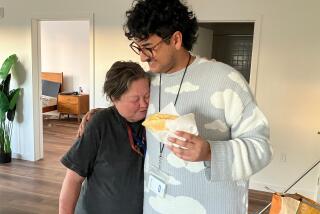COUNTYWIDE : Disabled Broaden Their Horizons
- Share via
Teri Longard quickly walked past flower gardens and buildings at UCI Medical Center in Orange, then through hallways and into an elevator that took her to one of four pharmacies where she picked up and delivered medicine.
On the face of it, it was just an ordinary delivery. But it was extraordinary because Longard, 31, is mildly retarded and has cerebral palsy.
She is one of five employees with mental or physical disabilities at the hospital who are trained and supervised by Vantage Foundation Inc., a Costa Mesa-based organization that secures jobs and trains clients as maintenance workers, painters, messengers and clerical workers.
After six years, Longard claims to know everyone and everything about the hospital.
“I’ll never leave my job,” she said as she closed the door to the pharmacy.
The program is geared to training adults with disabilities to be productive, but its value extends beyond helping handicapped individuals, said Vantage Executive Director Debbie Marsteller.
In the past, she said, adults with disabilities were trained only for a very narrow range of jobs and many times did not move out of the training programs set up for them. Today, she said, workplaces are being improved by the presence of the disabled workers, proving to employers that they can be valuable and trusted employees.
“Now agencies are starting to look at the people we’re serving,” Marsteller said. The Americans With Disabilities Act will force more employers by 1995 to hire people such as Longard and other Vantage clients.
Currently, Vantage has paid workers at 11 businesses and municipalities in the county. Among them are two wheelchair-bound maintenance workers who pick up trash on the boardwalk and pier in Newport Beach. One pulls a cart behind his chair and spots the trash, while the other follows closely behind, picking up the litter and dumping it into the cart.
Many times when an employer agrees to hire one of Vantage’s clients, the workplace undergoes restructuring to make room for the clients.
For example, a Vantage client may be able to handle a task that several employees without disabilities have to perform as part of their jobs. After a little rearranging, the client will do that task, such as running medicine from department to department as Longard does, freeing workers with more technical training.
To hire workers to stock a salad bar, employers were taught to put up pictures on a wall so the employees could figure out where to place the condiments. In laboratories, workers will place a rubber band around a beaker to show the client how much to put in it. And watches can be set to beep to signal a lunch break if the client can’t tell time.
“There is a benefit for everyone,” said program director Steve Stroh. “The other employees are getting to know a segment of the population that has been segregated, and they’re finding that these people have a lot to offer.
“For so many years, they have been on the receiving end of services and funds and now they have jobs, they’re paying taxes and paying into Social Security. The society as a whole is benefiting.”
Cheryl Day delivers X-rays faster than people who don’t have to use a wheelchair.
“It’s good for me, in fact, it’s excellent for me because if I didn’t have this job I wouldn’t live independently,” she said. “I would be in a group home.”
More to Read
Sign up for Essential California
The most important California stories and recommendations in your inbox every morning.
You may occasionally receive promotional content from the Los Angeles Times.










